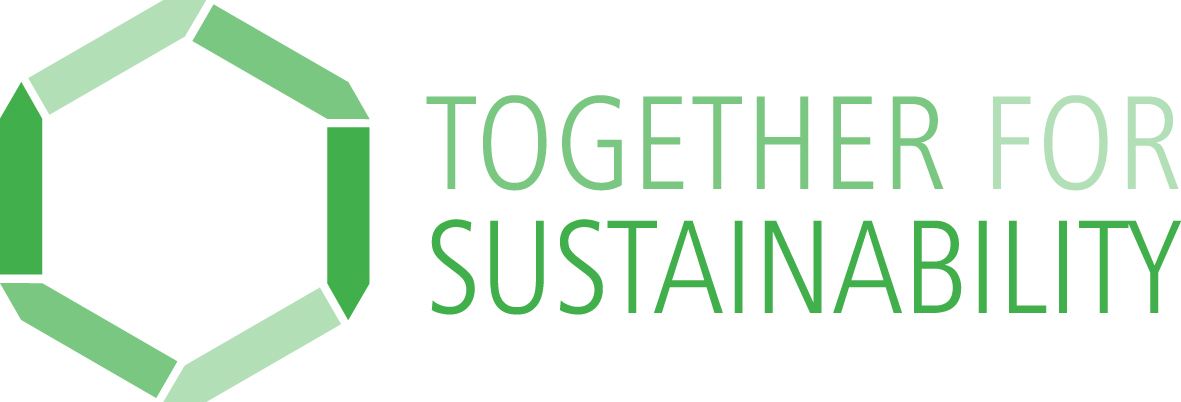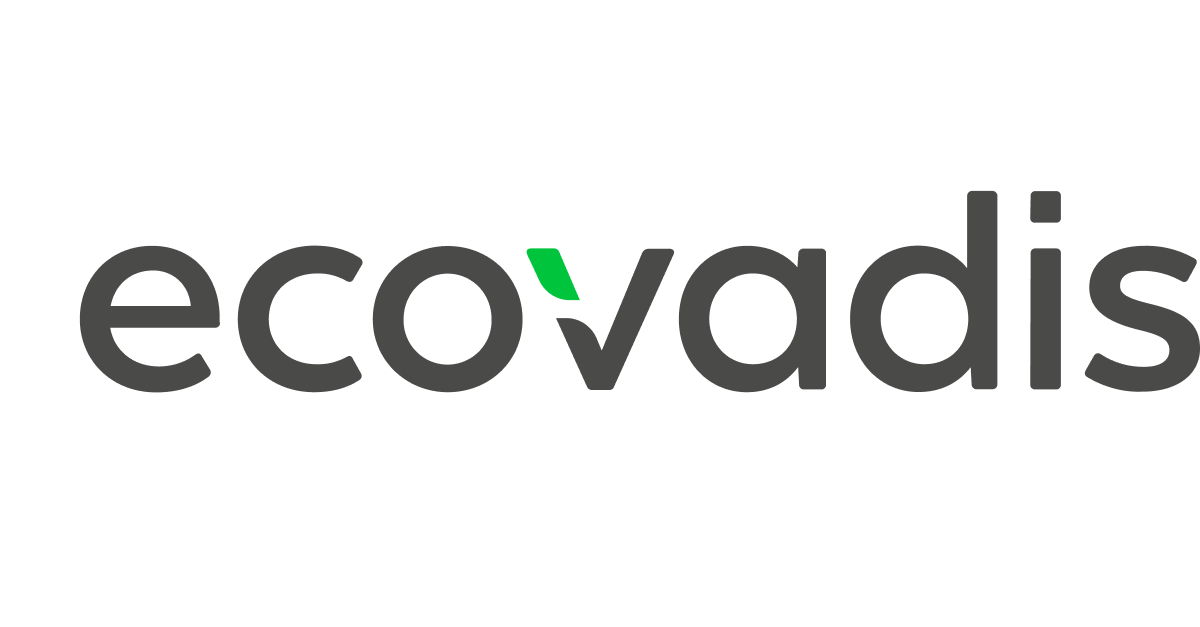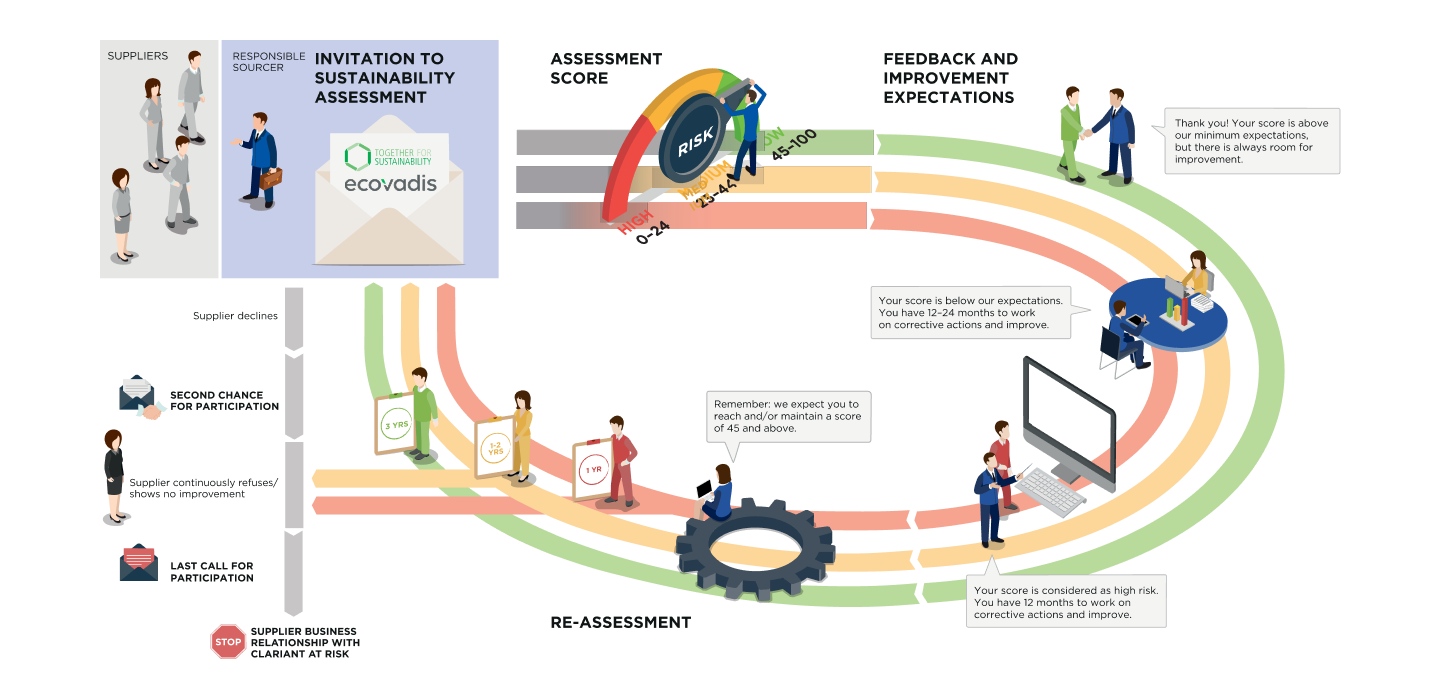Our supplier sustainability journey: partnering for impact
Since 2014, Clariant has been a proud member of Together for Sustainability (TfS)—a global initiative and industry network committed to advancing environmental, social, and governance (ESG) performance across chemical supply chains.
TfS is a peer-driven collaboration that sets the global benchmark for supplier sustainability. By joining forces with other chemical companies, we strengthen our ability to assess and improve ESG practices throughout our supply base, shaping a more sustainable industry together.


»We seek to minimize the environmental impacts of our products and ensure fair business practices across our value chains.«
Nicola Comiotto, Head of Global Function Procurement
A collaborative framework for measurable change
This Framework helps member companies evaluate supplier performance in key areas: management systems, environment, labor and human rights, ethics, and sustainable procurement. TfS assessments and audits result in a Corrective Action Plan (CAP) to address shortcomings. This enables suppliers to improve their sustainability performance and therefore increase their commercial appeal to responsible chemical buyers.
What sets TfS apart is its transparency model—assessment and audit results are shared among all member companies in compliance with competition laws, reducing duplication and bureaucracy for suppliers.
This collaborative approach benefits everyone: suppliers receive fewer redundant requests, and Clariant gains greater insight into the sustainability maturity of our partners, helping us to drive targeted improvements together.
Taking responsibility beyond our operations
Our sustainability journey doesn’t stop at Clariant’s gates. We recognize our shared responsibility with suppliers to reduce greenhouse gas emissions across the entire value chain.
Scope 3 (upstream) GHG emissions represent the largest portion of a chemical company's carbon footprint and are our key focus area. Clariant set SBTi-approved climate targets in 2021 for absolute reductions in scope 1, 2, and 3 greenhouse gas emissions from 2019 to 2030. To monitor, manage and reduce these emissions requires an industry-wide harmonized approach to calculation. The TfS Scope 3 GHG programme addresses this need. With the GHG programme, Tfs has developed a supplier toolkit fostering decarbonization of supply chains based on PCF Guideline, PCF Exchange solution (SiGREEN) and decarbonization training programme. We encourage our suppliers to adopt the TfS calculation methodology.
Clariant has enhanced this approach by developing our own automated system that is both TÜV-approved and TfS-compliant. This system allows us to efficiently measure, report, and reduce emissions while working collaboratively with our suppliers toward a low-carbon future.
TfS assessments: measuring and improving sustainability performance
Clariant uses EcoVadis, a leading global provider of sustainability ratings, to conduct TfS assessments through a shared digital platform. These evaluations cover 21 CSR criteria across four themes:
- Environment
- Labor & Human rights
- Ethics
- Sustainable procurement
EcoVadis provides suppliers with a clear, easy-to-understand scorecard that helps identify strengths and areas for improvement. Suppliers are encouraged to use these insights to develop corrective action plans, supported by Clariant when needed.
We invite suppliers to visit our EcoVadis portal for further guidance on Clariant’s sustainability requirements and assessment process.

Clariant has developed a supplier sustainability journey, which outlines Clariant’s expectations.
We invite suppliers to visit our EcoVadis portal for further guidance on Clariant’s sustainability requirements and assessment process. Download our infographic and learn more about our suppliers’ sustainability journey.

TfS Audits: verifying responsible practices on site
For selected suppliers, TfS audits are conducted by independent, pre-approved firms. These on-site evaluations examine production facilities, warehouses, or offices, based on internal risk and strategic criteria.
Audits verify practices against a rigorous checklist covering:
- Environmental impact
- Health & safety
- Labor rights
- Governance
- Management systems
TfS audits result in a supplier and site-specific Corrective Action Plan (CAP) addressing areas with scope for improvement. An audited supplier usually has 36 months in which to address all audit findings before a re-audit, though major findings are expected to be resolved within 12 months or immediately in case of critical findings.
Audit results are shared with all TfS members to support shared supplier development and risk mitigation efforts.
PCF Guideline: a new standard for product carbon footprints
Clariant is actively implementing the TfS Product Carbon Footprint (PCF) Guideline, which enables suppliers to calculate emissions consistently and accurately across all three scopes.
Taking the first steps in PCF calculation can be challenging. The Supplier Toolkit provides the resources needed, all in one place.
Having robust Product Carbon Footprint data that follows TfS PCF guidelines serves as the essential foundation for joining our Climate Initiative and developing an effective decarbonization roadmap
This breakthrough helps establish a standardized industry baseline for emissions data—simplifying comparisons, improving decision-making, and advancing climate action throughout the supply chain. For Clariant, it marks a pivotal step in reducing Scope 3 emissions and engaging our suppliers in science-based climate solutions.
Support and training: Ensuring continuous training among suppliers and those responsible for sourcing
Active supplier communication and engagement are essential elements of Clariant’s supply chain sustainability strategy. Standard responsible sourcer and supplier toolkits are regularly updated. In addition, Clariant Procurement systematically engages with suppliers in key sourcing markets, such as China, Brazil, and India to explain the company’s sustainability efforts, strategy, and expectations of suppliers via dedicated external training and webinars.
Managing risk with a holistic approach
While TfS assessments are the gold standard, we understand that not all suppliers—particularly smaller ones—have the capacity to participate. For these partners, Clariant collaborates with IntegrityNext, a trusted platform that includes sustainability criteria in its broader compliance assessments.
This dual-track approach ensures we maintain high standards while remaining inclusive and pragmatic in supporting diverse supplier capabilities.

